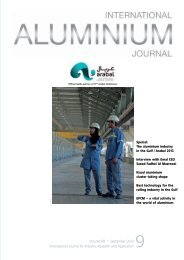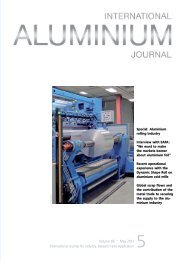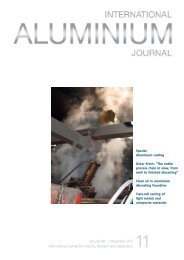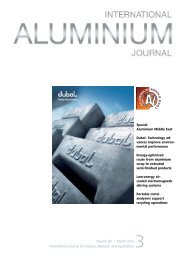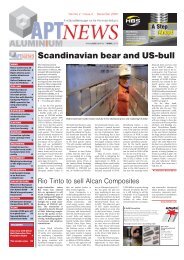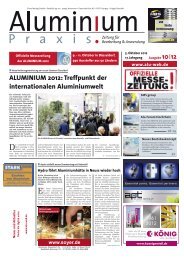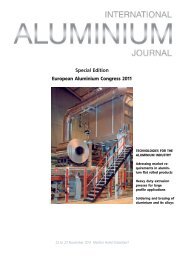SMS Siemag AG - Alu-web.de
SMS Siemag AG - Alu-web.de
SMS Siemag AG - Alu-web.de
Create successful ePaper yourself
Turn your PDF publications into a flip-book with our unique Google optimized e-Paper software.
economy<br />
In the limelight – the Arabal conference 2013<br />
The rise of the aluminium sector in the<br />
Middle East is one of the remarkable<br />
trends in this industry in recent years.<br />
Although production in the region only<br />
began in 1971, by 2020 smelters from<br />
the Gulf are expected to contribute nine<br />
percent of the world’s primary aluminium<br />
production. Recognition of the increasingly<br />
important role that the region plays<br />
is just one of the reasons why leading representatives<br />
from the industry will participate<br />
in the Arabal 2013 Conference.<br />
For the first time in its history this conference<br />
will take place in Abu Dhabi, from 5 to 7 November,<br />
with Emirates <strong>Alu</strong>minium (Emal),<br />
UAE, as the host. The Middle East’s premier<br />
tra<strong>de</strong> event for the global aluminium industry<br />
will both support the region’s position as a<br />
lea<strong>de</strong>r in primary aluminium production and<br />
showcase the advantages of doing business in<br />
the Gulf Cooperation Council (GCC).<br />
Arabal began in 1983 as a forum for the<br />
region’s producers to discuss matters of mutual<br />
interest. Over the past 30 years it has not<br />
only helped to strengthen ties within the GCC,<br />
but, reflecting <strong>de</strong>velopment in the Gulf, has<br />
grown beyond its regional origins, attracting<br />
international prominence.<br />
The growth of the aluminium sector in the<br />
GCC can be traced back to the early 1970s.<br />
In or<strong>de</strong>r to provi<strong>de</strong> economic diversity beyond<br />
oil and gas, governments in the region<br />
i<strong>de</strong>ntified aluminium as the metal of the future<br />
and began investing in the infrastructure<br />
nee<strong>de</strong>d to create a reliable source of quality<br />
primary aluminium. The first GCC smelter<br />
started production in Bahrain in 1971 and<br />
was followed by the establishment of Dubai<br />
<strong>Alu</strong>minium (Dubal) in the UAE, which began<br />
operations in 1979. In 2007 the UAE announced<br />
<strong>de</strong>tails of a second smelter for the<br />
country and Emal was created in Abu Dhabi.<br />
Oman’s Sohar plant started in 2008 followed<br />
by Qatar’s Qatalum the following year. The<br />
GCC currently has five smelters producing<br />
primary aluminium and another smelter in<br />
Saudi Arabia, the Ma’a<strong>de</strong>n Alcoa joint venture,<br />
near completion.<br />
These investments were based upon the region’s<br />
numerous strategic advantages, including<br />
its proximity to major aluminium markets<br />
in Europe, USA and the Far East. GCC smelters<br />
export around 80 percent of their total<br />
aluminium production, which highlights the<br />
importance of the GCC’s role in the global<br />
market.<br />
Strategic advantages of the Gcc region<br />
Port of the Khalifa Industrial Zone<br />
One of the strategic advantages is access to<br />
reliable and low-cost energy. In recent years<br />
energy costs for many producers around the<br />
world have increased, which makes the GCC<br />
an all the more attractive location. However,<br />
low energy costs are not the only reason why<br />
smelters in the Gulf are on the upswing. As<br />
there are recent investments in the region<br />
for expanding or building new smelters, the<br />
region is adopting the latest, highly efficient<br />
technologies, which provi<strong>de</strong>s another business<br />
advantage over competitors with ol<strong>de</strong>r infrastructure.<br />
Current primary aluminium production by<br />
GCC smelters is four million tonnes a year,<br />
which constitutes around 7.8 percent of total<br />
world production. With additional facilities<br />
set to come on stream over the next few years,<br />
production capacity in the region is set to<br />
rise to almost five million tonnes by 2015.<br />
And this trend is set to continue with forecasters<br />
estimating the GCC will be responsible<br />
for nine percent of the world’s aluminium<br />
production by 2020. Therefore, the region<br />
is in ‘pole position’ to take advantage of<br />
the forecasted six percent year-on-year rise in<br />
global <strong>de</strong>mand for aluminium over the next<br />
<strong>de</strong>ca<strong>de</strong>.<br />
However, GGC smelters are not only<br />
aligned to overseas sales. A major factor in<br />
the drive for economic diversification is <strong>de</strong>veloping<br />
the local downstream industry. The<br />
Gulf has access to huge regional and international<br />
markets: situated between Asia and<br />
Europe, advanced transportation links provi<strong>de</strong><br />
ready access to around two billion consumers<br />
across four time zones.<br />
Projects, such as Abu Dhabi’s Kizad (Khalifa<br />
Industrial Zone), support the diversification<br />
of the local industrial base by establishing<br />
hubs for manufacturing, logistics and tra<strong>de</strong><br />
for both local and international companies to<br />
take advantage of. Value is ad<strong>de</strong>d at every<br />
stage of the supply chain through efficiencies<br />
of scale, proximity and market access.<br />
Kizad is one of the world’s largest industrial<br />
zones and has ma<strong>de</strong> aluminium a focus<br />
for <strong>de</strong>velopment. Emal is one of the zone’s anchor<br />
clients and the proximity of Khalifa Port<br />
allows easy and quick movement of goods and<br />
raw materials. Kizad has also built the socalled<br />
Hot Metal Road allowing <strong>de</strong>livery of<br />
products directly from Emal to local companies.<br />
The downstream targets for Kizad are<br />
rolling and extrusion products as well as castings<br />
and forgings for industries such as construction,<br />
transport, packaging and engineering.<br />
The latest project is the Senaat / Ducab<br />
joint venture for aluminium rod. (For further<br />
<strong>de</strong>tails see News in brief section in this issue).<br />
By adding to the international profile of<br />
GCC countries, providing sustainable income,<br />
creating jobs and expanding the local economic<br />
base, aluminium is proving to be a<br />
major return on investment. This growing importance<br />
will be reflected at the Arabal 2013<br />
Conference. Already recognised as a strong<br />
networking platform for the industry, it will<br />
attract global aluminium lea<strong>de</strong>rs with an<br />
agenda which will not only focus on <strong>de</strong>velopments<br />
in the region, but also provi<strong>de</strong> insights<br />
and perspectives from around the world. ■<br />
© Kizad<br />
24 ALUMINIUM · 11/2013



